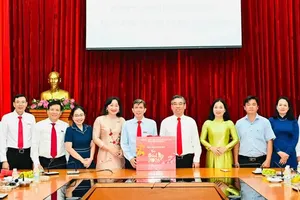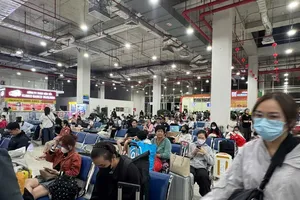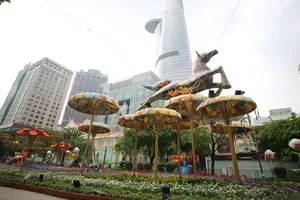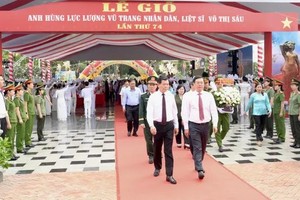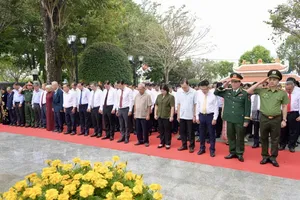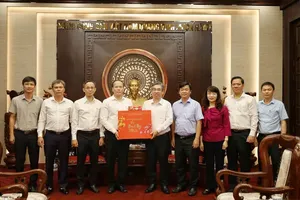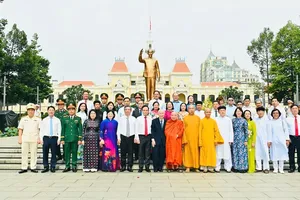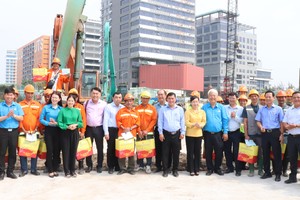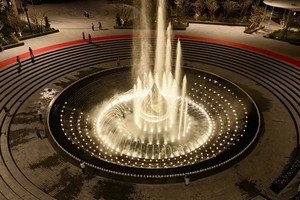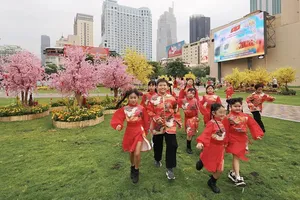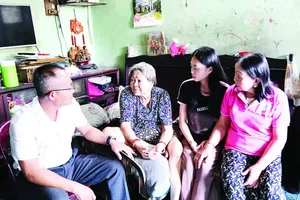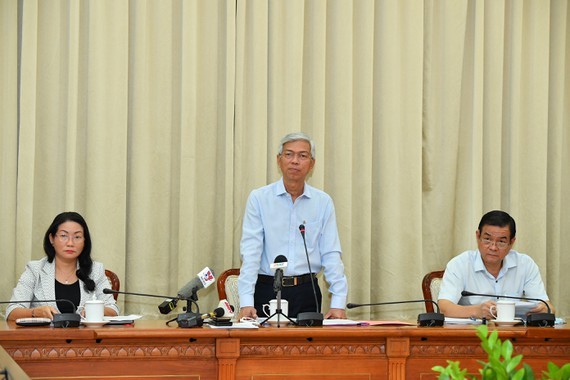
Speaking at the meeting, Mr. Vo Van Hoan affirmed that noise is not a big problem. However, it has become an issue due to the lack of resolution. Currently, noise is an urgent issue that needs control. Noise violation is inappropriate behavior in urban areas, affecting the community health, reducing the quality of life of citizens. Therefore, the city seeks to handle the problems that reduce the quality of life and is determined to thoroughly handle noisy leisure activities.
Mr. Hoan assessed that over the past time, HCMC still punished cases of noise violations, instead of doing nothing. However, the city had not done well, had not fully understood the regulations, and had not clarified the responsibilities of agencies in handling noise violations. He emphasized that the city plans to launch an operation temporarily called the noise problems and actions of HCMC, focusing from now until the end of this year. The goal of this operation is to thoroughly handle and end noise nuisance this year. After the operation, the city will make preliminary review and evaluation and continue to carry out this work as a regular work of agencies, units, and localities.
Mr. Hoan said that handling noise violations should be implemented comprehensively and divided into two phases. The first important thing that the city should do is to make people and enterprises understand and commit not to making noise, affecting the lives of neighbors. Phase 1 will be carried out from now to May 23.
As for apartment buildings, any apartments that already have regulations on noise pollution, citizens will continue to follow them. Any apartment buildings that have not had any regulations, must add regulations of no karaoke singing in the apartment building. For the residential areas, Mr. Hoan asked the localities to approach cases that repeatedly cause noise nuisances to convince these cases to commit not to violating again. For business establishments, restaurants, and eateries with music, causing noisy surroundings, he ordered the localities to persuade them to commit not to do this activity. In the case of singing or opening music, it must be done in a specific closed room of the establishments, like karaoke. Do not sing, do not play loud music in open spaces, even in the space of the establishments, affecting other people.
In phase 2, starting from May 23, Mr. Hoan asked competent authorities to check and strictly slap penalties on noise violations. He reminded the localities that they often make excuses that they do not have sound level meters to determine the intensity of the sound, so they cannot handle noise violations.
He pointed out that the sound level meter is only applicable in a specific space - a closed room, and in open spaces and public spaces, even if they have the device, it is not usable. "If so, should we just give up?!", he asked. Answering the above question, he affirmed that in fact, that behavior can be handled by applying many different rules, instead of letting it walk. Therefore, the Vice Chairman of HCMC People's Committee Vo Van Hoan requested that local authorities should not struggle for having no tools, no people, and no time to handle it to avoid resolving noise violations. On the contrary, in handling noise violations, there must be coordination and responsibility-sharing of agencies and units, and the role and responsibility of the leaders. It must be seen as a must to ensure a peaceful life for citizens.
As for the direction and basis for handling noise violations, Mr. Hoan clearly stated four decrees that departments, industries, districts, wards, and communes need to focus, apply smoothly, and supplement each other. That is the application of Decree No.100/2019/ND-CP on the regulations on sanctioning of administrative violations in the field of road and railway traffic to handle eateries, restaurants, karaoke establishments with vehicle roadside encroachment.
In the application of Decree No.167/2013/ND-CP on sanctioning of administrative violations in the fields of security, social order and safety, social evils prevention, fire protection, and domestic violence prevention, Mr. Hoan instructed that besides administrative sanctions for acts of violating the regulations on ensuring general tranquility under Clause 1 and Clause 2 of Article 6, it is necessary to apply the additional measure of confiscation of exhibits of administrative violations following Clause 3 of this Article.
Mr. Hoan assessed that over the past time, HCMC still punished cases of noise violations, instead of doing nothing. However, the city had not done well, had not fully understood the regulations, and had not clarified the responsibilities of agencies in handling noise violations. He emphasized that the city plans to launch an operation temporarily called the noise problems and actions of HCMC, focusing from now until the end of this year. The goal of this operation is to thoroughly handle and end noise nuisance this year. After the operation, the city will make preliminary review and evaluation and continue to carry out this work as a regular work of agencies, units, and localities.
Mr. Hoan said that handling noise violations should be implemented comprehensively and divided into two phases. The first important thing that the city should do is to make people and enterprises understand and commit not to making noise, affecting the lives of neighbors. Phase 1 will be carried out from now to May 23.
As for apartment buildings, any apartments that already have regulations on noise pollution, citizens will continue to follow them. Any apartment buildings that have not had any regulations, must add regulations of no karaoke singing in the apartment building. For the residential areas, Mr. Hoan asked the localities to approach cases that repeatedly cause noise nuisances to convince these cases to commit not to violating again. For business establishments, restaurants, and eateries with music, causing noisy surroundings, he ordered the localities to persuade them to commit not to do this activity. In the case of singing or opening music, it must be done in a specific closed room of the establishments, like karaoke. Do not sing, do not play loud music in open spaces, even in the space of the establishments, affecting other people.
In phase 2, starting from May 23, Mr. Hoan asked competent authorities to check and strictly slap penalties on noise violations. He reminded the localities that they often make excuses that they do not have sound level meters to determine the intensity of the sound, so they cannot handle noise violations.
He pointed out that the sound level meter is only applicable in a specific space - a closed room, and in open spaces and public spaces, even if they have the device, it is not usable. "If so, should we just give up?!", he asked. Answering the above question, he affirmed that in fact, that behavior can be handled by applying many different rules, instead of letting it walk. Therefore, the Vice Chairman of HCMC People's Committee Vo Van Hoan requested that local authorities should not struggle for having no tools, no people, and no time to handle it to avoid resolving noise violations. On the contrary, in handling noise violations, there must be coordination and responsibility-sharing of agencies and units, and the role and responsibility of the leaders. It must be seen as a must to ensure a peaceful life for citizens.
As for the direction and basis for handling noise violations, Mr. Hoan clearly stated four decrees that departments, industries, districts, wards, and communes need to focus, apply smoothly, and supplement each other. That is the application of Decree No.100/2019/ND-CP on the regulations on sanctioning of administrative violations in the field of road and railway traffic to handle eateries, restaurants, karaoke establishments with vehicle roadside encroachment.
In the application of Decree No.167/2013/ND-CP on sanctioning of administrative violations in the fields of security, social order and safety, social evils prevention, fire protection, and domestic violence prevention, Mr. Hoan instructed that besides administrative sanctions for acts of violating the regulations on ensuring general tranquility under Clause 1 and Clause 2 of Article 6, it is necessary to apply the additional measure of confiscation of exhibits of administrative violations following Clause 3 of this Article.
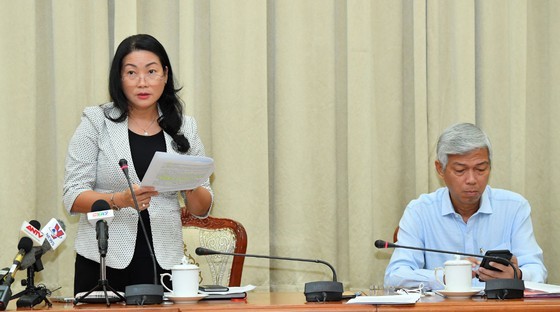 Deputy Director of the Department of Natural Resources and Environment Nguyen Thi Thanh My speaks at the meeting. (Photo: SGGP)
Deputy Director of the Department of Natural Resources and Environment Nguyen Thi Thanh My speaks at the meeting. (Photo: SGGP)
In the sanctioning under Decree No.155/2016/ND-CP on administrative sanctions in the field of environmental protection, Mr. Hoan instructed grassroots officials to make field trips at noisy eateries to make voice and video recordings and make records for handling. To handle business behaviors that are not in accordance with business licenses, he requested the application of Decree No.98/2020/ND-CP on sanctioning administrative violations in commercial activities, producing and trading counterfeit goods, prohibited goods, and protecting consumers' interests. According to Mr. Hoan, each violation will apply specific terms for sanctions, and it will not be very difficult to handle noise violations, with overall coordination. Mr. Vo Van Hoan directed districts, wards, and communes to actively inspect and handle noise violations. At the same time, the Department of Natural Resources and Environment is assigned to set up a working group and select places for unexpected inspection. If any violations are detected, the Chairman of the district People's Committee must take responsibility for letting noise become an issue due to the lack of determination in tackling. He also assigned the Department of Information and Communications, which directly manages the 1022 switchboard, to report daily to the municipal People's Committee on the situation of receiving complaints of citizens on noise and the handling results of localities, specifying which locality did handle, and which locality did not. Earlier, Deputy Director of the Department of Natural Resources and Environment Nguyen Thi Thanh My said that noise nuisance is divided into four groups: Group 1- from karaoke services, large-scale entertainment venues and services, such as bars, discotheques, and beer clubs; Group 2 - sidewalk pubs that play music or let customers sing karaoke by high-powered portable speakers; Group 3- households equipped with sound systems, speakers, karaoke, music players, weddings, funerals, and birthdays; Group 4- types of businesses using advertising loudspeakers, and public places. Of these groups, Groups 2 and 3 are receiving public attention. Specifically, it is noise from portable karaoke speakers. The handling results of noise violations of 17 districts that have made reports show that districts fined 141 cases with a total amount of more than VND818 million. However, only 20 out of 141 cases of noise violations in residential activities were fined with the amount of VND2.6 million. The sanctions were applied according to Decree No.155/2016/ND-CP and Decree No.167/2013/ND-CP. The difficulty in handling noise violations is that the current noise limit standards do not stipulate the measurement of background noise as a basis for determining the noise level, so the handling of authorities has not been convincing. There are no regulations on noise frequency. Singing karaoke with portable speakers takes place in residential areas and usually lasts after 10 p.m. Because it is outside office hours, the People's Committees of districts, wards, and communes face difficulties in checking, detecting violations, and handling. Meanwhile, the sanction level under Decree No.167/2013/ND-CP remains low, not enough for deterrence while sanctioning according to Decree No.155/2016/ND-CP requires measurement results, and these results must be conducted by competent units. As for the solution, the report by the Department of Natural Resources and Environment introduces two solutions for propaganda and advocacy (phase 1) and enhancing inspection and handling of violations (phase 2). Particularly, the police will intensify inspecting and handling pubs and restaurants, which are reported by citizens for using speakers to play music loudly or portable speakers for singing karaoke. Besides noise inspection, people also check the compliance with regulations in other fields, such as traffic, business registration, fire protection, food safety, and hygiene, to promote effectiveness in preventing violations. The Department of Culture and Sports of HCMC will lead and coordinate with competent units to strengthen the handling of noise-related violations at service establishments, such as bars, beer clubs, discotheques, and restaurants. Thu Duc City and districts will actively inspect cultural activities, cultural services of organizations and individuals in their management areas, direct the People's Committees of wards, communes, towns, and quarters to coordinate with the regional police to receive and promptly handle noise-related complaints, and take responsibility to the Chairman of the People's Committee of districts if noise violations occur repeatedly in their management areas. Chairman of the People’s Committee of District 12 Le Truong Hai Hieu said that the most difficult thing is to have evidence to handle violations. He said that most of the cases stopped singing and playing music loudly when the local police came to remind them. The problem is whether the local police come, whether they know to come or not, and whether it is obligated to come or not. Therefore, local officials and police must be responsible to resolve complaints of citizens. As for noise measurement, he said that ward officials could do it if they were trained for noise assessment. He suggested that with the contents of handling noise nuisances that the law has not had sanctions, they should be included in the village conventions and conventions in the residential community for the people to commit to complying with them.
